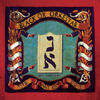 The first thing that comes to mind when reading about modern Jewish music born out of a multitude of influences, backgrounds, and traditions including both Eastern European Gipsy and 20th century jazz/improv matched with lyrics which come from Jewish poetry is Klezmer, but Black Ox Orkestar, formed from members of Silver Mt. Zion, Godspeed You Black Emperor, and Sackville, does not play Klezmer. Klezmer is vocal dance music, often used for festive occasions like weddings, born from hardship but designed to lift spirits while the Orkestar take a much more solemn approach.
The first thing that comes to mind when reading about modern Jewish music born out of a multitude of influences, backgrounds, and traditions including both Eastern European Gipsy and 20th century jazz/improv matched with lyrics which come from Jewish poetry is Klezmer, but Black Ox Orkestar, formed from members of Silver Mt. Zion, Godspeed You Black Emperor, and Sackville, does not play Klezmer. Klezmer is vocal dance music, often used for festive occasions like weddings, born from hardship but designed to lift spirits while the Orkestar take a much more solemn approach.
While I don't think the quartet are out to change their sound, Nisht Azoy (which translates to "Not Like This") is more upbeat and varied than their debut, Var Tanszt?. Once again split down the middle for vocal and instrumental pieces, the eight song album has three fast-paced uplifting dance numbers. The air is still thick with sorrow on the slower, heavier songs, which, entirely sung in Yiddish, thankfully have English and French translations in the accompanying booklet.
After the slow, almost weeping sound of the opener, "Bukharian," follows the lyrical "Az Vey Dem Tatn," (Sad is the Father) which is explicitly sad, with lyrics from an anonymous poet who writes about being sent to war and shot, but is actually moderately more upbeat. Here, singer Scott Levine Gilmour calls out as the rest of the group sings out their response while the group skillfully flex their mastery of what is most likely an oud and mandolin, playing along with the drums and fabulous Eastern strings that come in towards the end. Fans of the One Ensemble of Daniel Padden live CD released last year would find a lot to love here. "Violin Duet" is the first real dance number but is like two different songs: a lengthy opening with only two violins playing gives way to a lively instrumental tune equipped with hand claps and everything. The emotion returns for the slow and at times, sparse "Ikh Ken Tsvey Zayn," side one's closer, where Steve once again gives a heavy delivery, this time a poem by a Polish-Jewish author, written in 1948 after his move to Montreal.
Side two (or track 5 of 8 for a CD person) opens with the vibrant, exciting, bright instrumental dance piece "Ratsekr Grec," equipped with plenty of wind instruments: a trumpet solo and some interplay from what is most likely the clarinet and contrabass. The seriousness returns with the epic "Tsvey Taybelakh" (Two Doves), another anonymous poem, this one a story about the love that cannot be denied despite the powers that try to separate the two lovers. While it's a message of hope, assuring "you will not drown in sorrow" and "you will not be burnt in sorrow," it is heavy with emotion, begining slow, breaking down during an instrumental break with droning strings and a lonely clarinet solo, all of which build to a rushing climax. "Dobriden" is the last upbeat dance song, sounding more like a European renaissance-era piece before the stunning closer "Golem," written by singer Scott Levine Gilmour.
Black Ox Orkestar have managed to both diversify their sound and make something more concentrated, more focused with these powerful eight songs. Be sure to show up early at the Silver Mt. Zion shows this summer because the Black Ox live show is something not to be missed, and those who don't believe me can watch The Eye special for proof.
samples:
Read More

